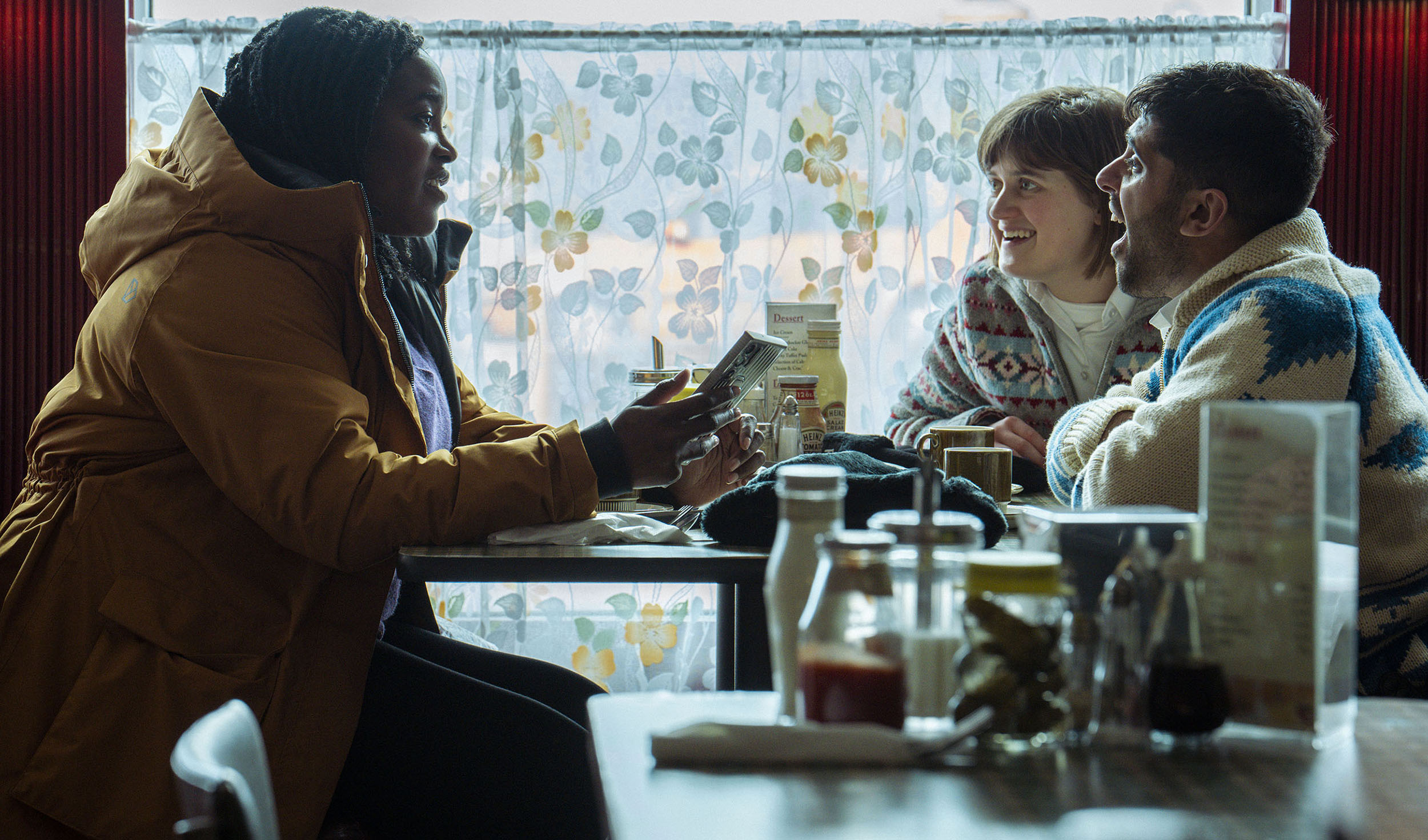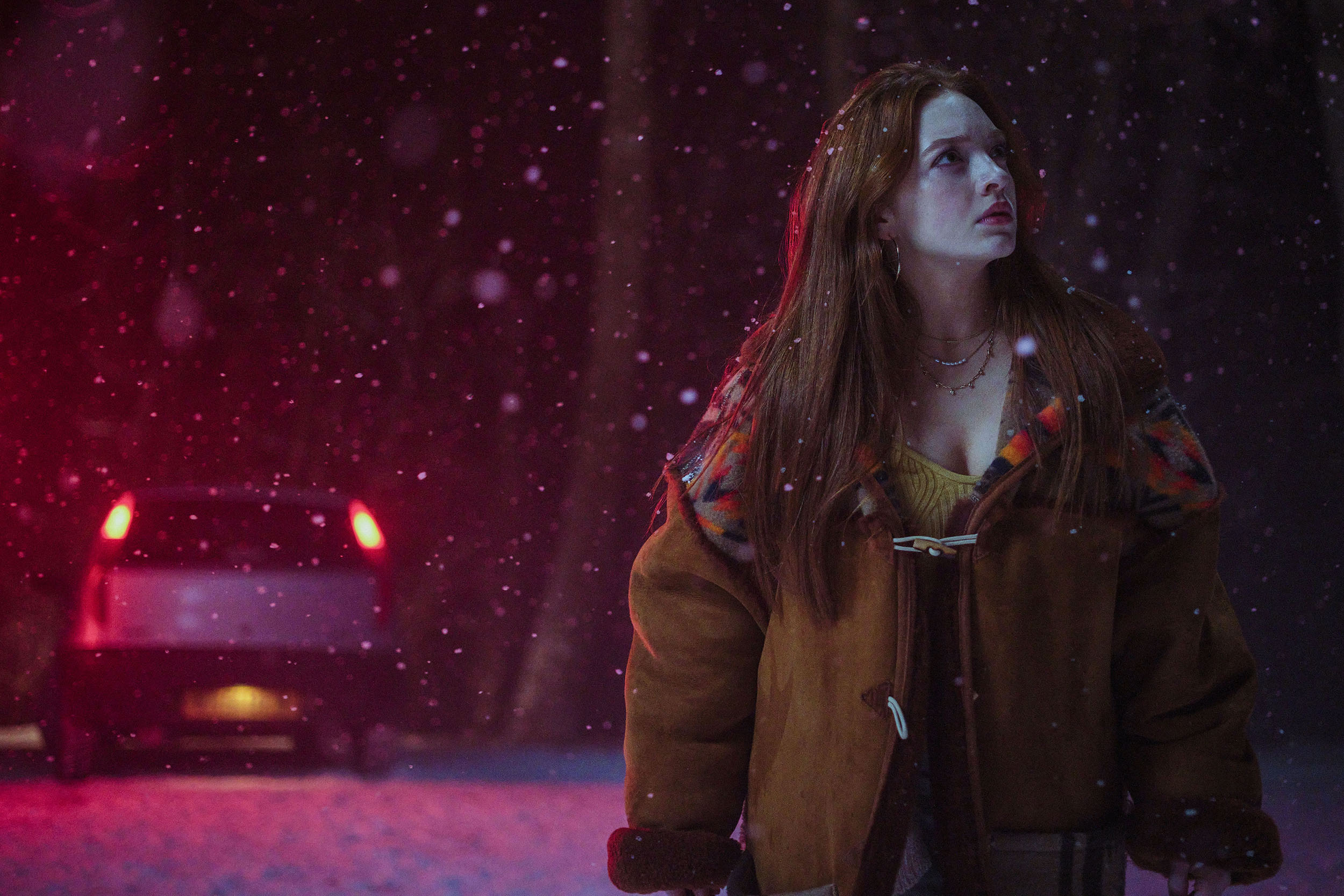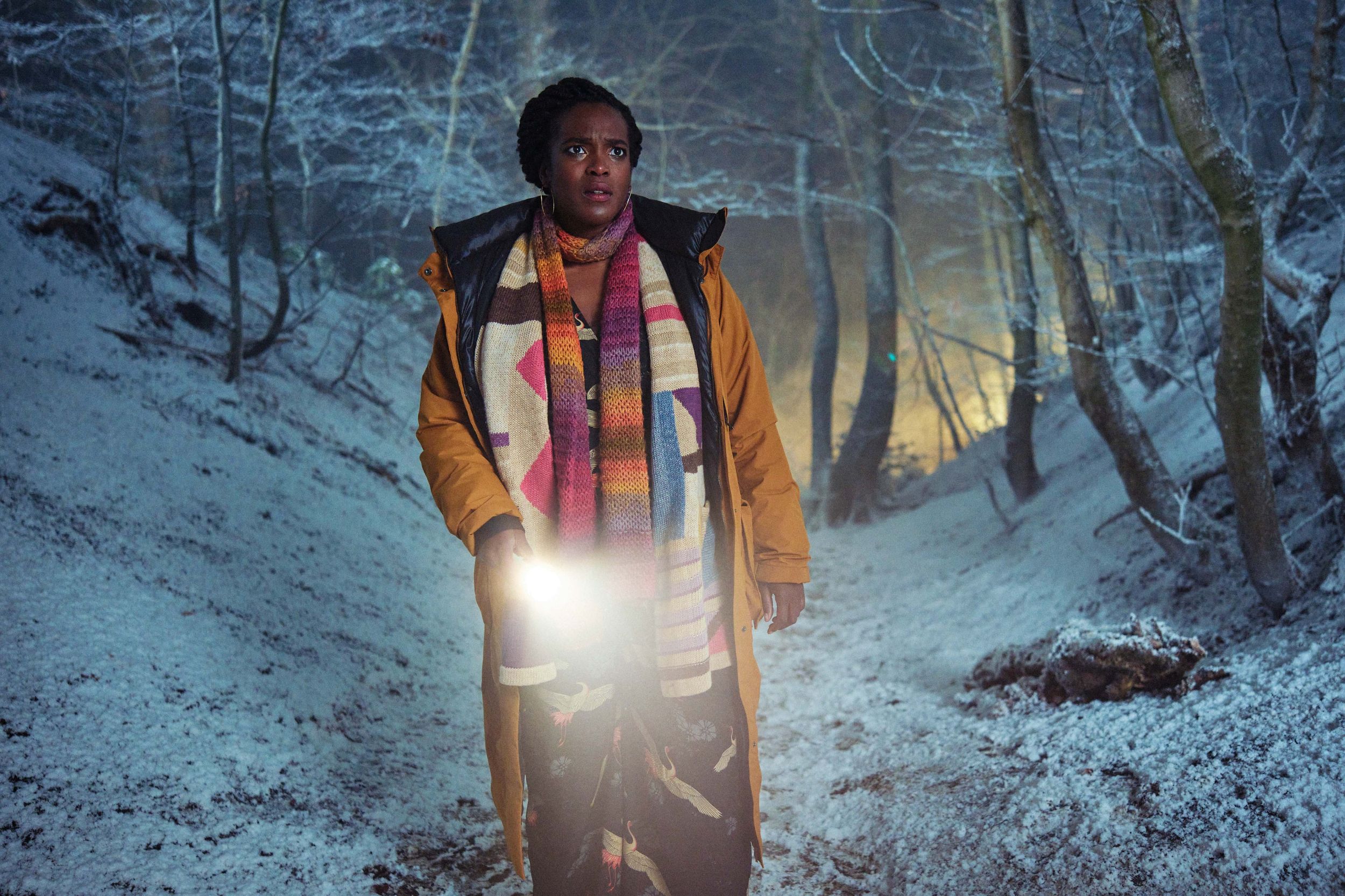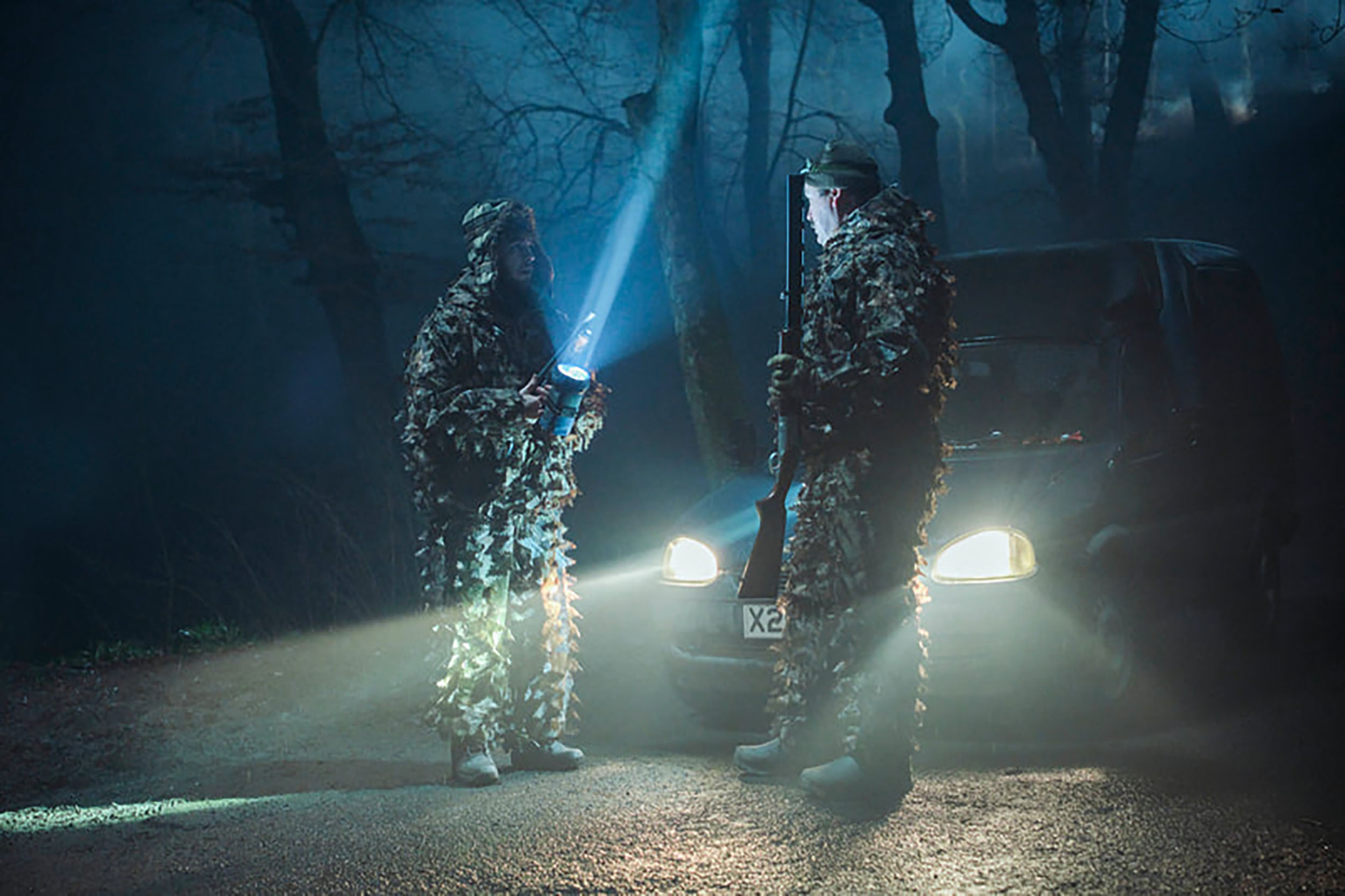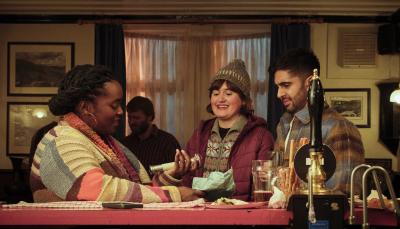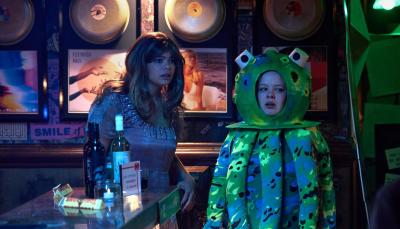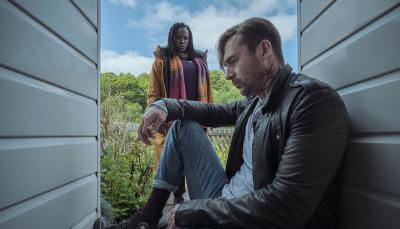'Passenger's' Wunmi Mosaku & Andrew Buchan on Bringing Chadder Vale to Life
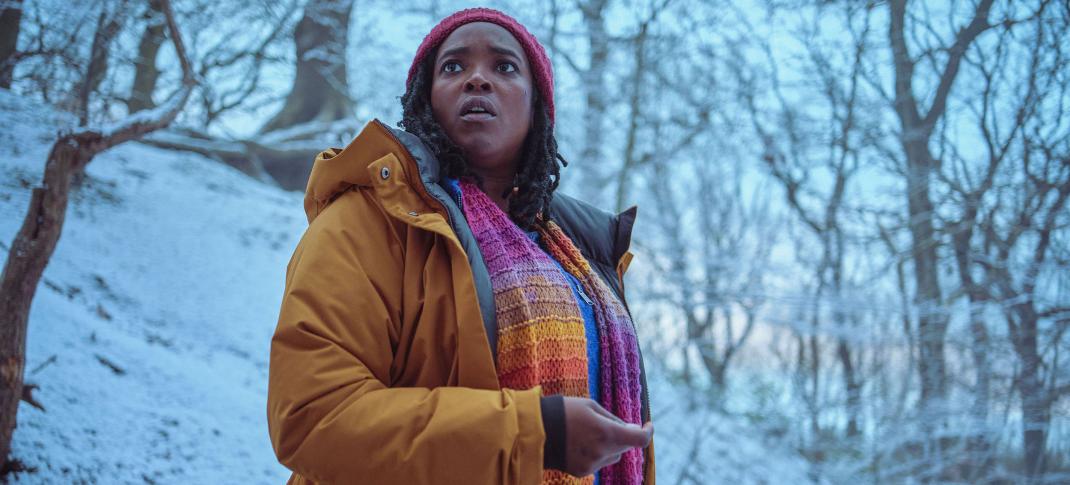
Wunmi Mosaku as DC Riya Ajunwa in "Passenger"
(Photo: Courtesy of BritBox)
It seems safe to say that BritBox’s Passenger is unlike almost any other television show that’s aired this year. The six-part series hails from Andrew Buchan, probably best known to Anglophiles as grieving father Mark Latimer in the crime drama Broadchurch. But his debut screenplay couldn’t be a more different sort of story. The genre-bending series is part mystery, part horror story, and part off-beat comedy, all revolving around a small Northern English village with dark secrets of both the literal and the figurative variety.
A tale of community, outsiders, and our collective fear of the unknown, Passenger features everything from mysterious disappearances and bizarre wildlife deaths to a local conspiracy that seems to be covering up for something much more disturbing than humans. With nods to everything from Twin Peaks to Happy Valley, it’s a slow-burn unraveling meant to keep viewers guessing until its final installment.
We had the chance to sit down with Buchan and star Wunmi Mosaku (best known for her role in Loki), who plays former London police detective Riya Ajunwa, during New York Comic Con to chat about the origins of Passenger, the series’ complicated horror elements, and whether we’ve seen the last of Chadder Vale.
This interview has been edited and condensed for clarity. Spoilers ahead!
Telly Visions: Passenger is a complicated show that is hard to explain. How would you describe it?
Wunmi Mosaku: I would describe it as a “super unnatural thriller.” It’s set in a tiny town called Chadder Vale in the north of England, where regular people try to ignore the irregularities in their lives. It’s about fear and how people deal with it, whether they deal with it, ignore it, or do something else with it and distract themselves from it. It’s about what a community does when they’re afraid.
TV: Andrew, most know you best as an actor. What made this the story you wanted to tell for your screenwriting debut?
Andrew Buchan: This is an idea that’s been percolating for a while. I think I’ve had this idea since I was a kid. I grew up in Bolton, not far from Manchester in the north of England. What you realize growing up in a place like that is that these communities are wonderful [places], and there’s a warmth and a magic to them. There’s magic to the people there and a shorthand of how they act and speak. No matter how dark or desperate the struggle, they flatten it with warmth and wit. Anecdote is the antidote.
I wanted to create a fictional Northern community and puncture it with something obscure and otherworldly that would detonate as much wit as possible and push all their reactions to the limit. But I didn’t want to place just any old thing inside there. I wanted what has always drawn me to the shows I like—the traditional colliding with something unknown.
I’m just an apprentice at this; I’ve worked for some masterful writers, and I don’t consider myself anywhere near the same league as any of them. All I can offer from my layman’s perspective is that nowadays, it feels like we are in a place where we dual-screen a lot as a society. So, as soon as we press play on something on the telly, we pull out our phones. Our attention is always divided—the telly might get 50%. It might get 30%. I wanted to write something definitive, experimental, and imaginative that would demand an audience’s attention.
TV: One of the things the horror genre does best is using the scary and supernatural to explore things we’re wrestling with in real life. What’s the thing that people in Chadder Vale are afraid to look at, metaphorically speaking?
Buchan: Horror serves as a catalyst for the show to explore fear, which is one of the big themes. Particularly in those communities these days, it’s exploring what we pin our fears on and how often we’re pinning them on the completely wrong things. Instead of looking right or left to see where the danger really is, we just concentrate on the thing that’s right in front of us and choose to ignore it. It’s above and beyond anything else about fear.
Mosaku: I feel like many people are afraid of looking within. Are they fulfilling their full potential? Are they living in their purpose? Are they are they moving forward? If they’re not, it’s a scary realization. So, instead of trying to live in your purpose and taking that risk, it’s easier just to “Keep Calm and Carry On.” The British way! We Northerners like to flatten anything uncomfortable with humor, and the show is really funny.
TV: What first appealed to you about Riya as a character or drew you to playing her?
Mosaku: I’ve been attached to this since Andy sent me the first draft in 2017, and he kept writing Riya with me in mind. Which you know is kind of scary because you think, “Oh, what happens if you’re not good?” Thankfully, I never felt like that. What was [so appealing was finding out Riya’s why and realizing that this strong, loud, opinionated, no-bullsh*t person is quite brittle and needs a bit of love and a little connection, a community.
She’s good at faking it; she’s good at running away. She’s good at not looking herself dead in the eye. Sarcasm is her defense mechanism. Her arrogance, intelligence, and all that stuff are just things she uses to keep people away.
TV: Did you know all of Riya’s story before filming Passenger, or did you find out her story piecemeal?
Mosaku: We figured some of it out in rehearsal. We had two weeks of rehearsal, and we’re like…what, how is she here? Why is this woman here? How did she get here? Why is she staying here? We worked it all out throughout. We started with Episodes 1 and 2, then we had a break and got Episode 3, then another break, then started four, five, and six.
TV: Is that easier than shooting out of order and trying to hold different pieces of where you are in the story in your head?
Mosaku: It is, but…I like having the whole story in my head, but I love to shoot in order. But I think having the entire story in the head is a little easier because what if you found out…oh, she’s a serial killer at the end? Whoops, I wish I did something different.
TV: As Andrew was an actor before he was a writer, was it easier or more challenging to work with someone who’d been on both sides of it?
Mosaku: Easier. Because he’s asking the same questions I’m asking of Riya, but he’s asking for all his characters. There weren’t many holes to fill because he’d already asked the questions. He’s done all the research, so it’s already all there.
TV: Andrew, did your experience as an actor help make working with and writing with the cast easier?
Buchan: It was essential to me, as an actor, to make sure all the characters were three-dimensional and no storyline was too thin or too superficial. I did enjoy the writing, but honestly, the whole process was a complete joy. Whether you’re an actor, a producer, a director, a writer, whatever, you’re in the business of creativity, period. Everyone at BritBox and Sister Pictures made it effortless for me. They were so collaborative and generous, and, yes, deadlines were imposed, but they weren’t horrific. They were manageable.
TV: Passenger’s such a slow burn, with so many moving pieces and narrative balls in the air. How did you decide how to frame what’s happening onscreen?
Buchan: We purposely wanted to pull back and keep everything for Episode Six. We wanted to purposefully leave a trail of breadcrumbs [for viewers to follow]. It’s all in there. Even what the lady says on the radio in Riya’s car at the beginning of Episode 1... Let’s just say it’s not a bad idea when you do get to the end to go back and watch from the start again.
TV: What are you most excited for people to see or experience about the show?
Mosaku: I’m excited for people to see the North of England in such a beautiful, cinematic, and rich way. It’s a story that needs patience: It has a lot of intrigue and is not linear or written simply. I like that you have to work for it. I think American shows do that a lot: make you work for it. I'm excited for people to be like, I haven't seen this before, and I dig it.
Buchan: I don’t think viewers will have likely seen many Northern English communities depicted like this onscreen. I love what the actors have collectively done with it, with this story, and the way they've just thrown themselves at it. It's a very unexpected journey.
TV: I haven't seen the finale yet, so I can’t tell you whether I think this show could continue into another season. But...could it?
Buchan: This is just a limited series, but that isn't to say that I don't have ideas mapped out. If that were to happen—giant IF—and we got to make a second season, let’s just say this is the tip of the iceberg.
Passenger continues on BritBox with two episodes a week on Thursdays through October 31, 2024.

